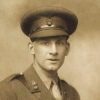Siegfried Sassoon

Siegfried Sassoon
Siegfried Loraine Sassoon, CBE, MCwas an English poet, writer, and soldier. Decorated for bravery on the Western Front, he became one of the leading poets of the First World War. His poetry both described the horrors of the trenches, and satirised the patriotic pretensions of those who, in Sassoon's view, were responsible for a jingoism-fuelled war. Sassoon became a focal point for dissent within the armed forces when he made a lone protest against the continuation of the war in...
NationalityEnglish
ProfessionPoet
Date of Birth8 September 1886
And the wind upon its way whispered the boughs of May, And touched the nodding peony flowers to bid them waken.
Soldiers are dreamers; when the guns begin they think of firelit homes, clean beds, and wives.
I have seen and endured the sufferings of the troops, and I can no longer be a party to prolong these sufferings for ends which I believe to be evil and unjust.
Life for the majority of the population. Is an unlovely struggle against unfair odds. Culminating in a cheap funeral.
You smug-faced crowds with kindling eye Who cheer when soldier lads march by, Sneak home and pray you'll never know The hell where youth and laughter go.
December stillness, teach me through your trees That loom along the west, one with the land, The veiled evangel of your mysteries. While nightfall, sad and spacious, on the down Deepens, and dusk embues me where I stand, With grave diminishings of green and brown, Speak, roofless Nature, your instinctive words; And let me learn your secret from the sky, Following a flock of steadfast-journeying birds In lone remote migration beating by. December stillness, crossed by twilight roads, Teach me to travel far and bear my loads.
And when the war is done and youth stone dead, I'd toddle safely home and die--in bed.
For it is humanly certain that most of us remember very little of what we have read. To open almost any book a second time is to be reminded that we had forgotten well-nigh everything that the writer told us. Parting from the narrator and his narrative, we retain only a fading impression; and he, as it were, takes the book away from us and tucks it under his arm.
The dead...are more real than the living because they are complete.
The fact is that five years ago I was, as near as possible, a different person to what I am tonight. I, as I am now, didn't exist at all. Will the same thing happen in the next five years? I hope so.